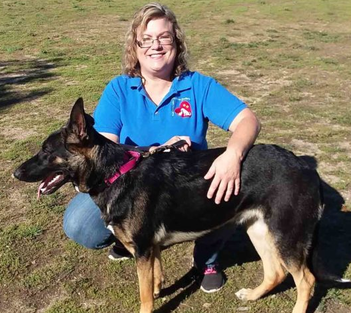The "Why" of Alliance Dog Training
Good Grief! How Did Dog Training Become So Sleazy?
If you are reading this, you are most likely researching dog training facilities for your furry family member.
The dog training industry is scary space for the dog-loving public to navigate. There are generally two training methodologies and many shades of gray in between. Many dog trainers aren't transparent about what methods they actually use. This is unethical, but not illegal.
Buzz words like positive, relationship, reward, energy, and balanced are used when describing training methodologies, but there isn't standardized marketing language. There also aren't any requirements for truth in advertising. The internet is full of outdated dog training information and myths about behavior. Unfortunately, the dog training industry is completely unregulated and anyone can call themselves a dog trainer without any sort of credentialing or education. Many professional dog trainers are pushing for industry regulation, but it is unlikely to happen anytime soon. The best way our industry can prevent unethical dog training practices is to educate the public. I spent 5 years working with shelter dogs in Santa Barbara County as a staff trainer/instructor, contract trainer, and volunteer, so I am well aware of the heartbreaking consequences of unethical and dangerous dog training practices.
Alliance Dog Training was formed with the idea that modern, science-based humane training should be visible and accessible to the public. The location of our facility was chosen with the intent of educating as many dog parents as possible.
Training in the 80's
My name is Sarah Dyar and my family owns Alliance Dog Training. I am often asked how long I've been training. 40 years?? That's a tough question to answer, because I don't ever remember NOT training.
When I was in grade school I could often be found training my dogs to do tricks or sending them over jumps I built in the backyard.
I began competing at dog shows my first year of high school. I had success, and even thought about training professionally. That idea only lasted until I learned the harsh ways pros "fix" dogs with aggression issues. In the 80's, it was common for trainers to choke dogs unconscious. I knew I couldn't stomach treating dogs that way, so I abandoned that career path. Thankfully, the story doesn't end there!
Years passed and force-free training became the norm. I bought a book about clicker training and started training my own dogs using this method. My dogs responded so well and I was hooked! I continued to train my dogs after I got my "adult job" in banking operations. I did fairly well in banking, but I always knew it wasn't meant to be my life's work.
I Was Beyond Disgusted!
I started a pet sitting and dog walking business in 2005. My decision to train dogs professionally stemmed from getting really mad about an incident with a dog belonging to a very dear client. The newly adopted dog needed training, so she was sent to "camp" at a well known board and train facility. When the 8 pound dog returned from training, she was fearful and aggressive. Afterward, my client learned what had been done to her dog during her stay at the training facility. She was very upset and reached out to me for help. I was beyond disgusted that good people like my client spend their hard-earned money only to be misled about how their dogs will be trained. I decided at that moment I would do what I could to advocate for ethics in dog training and for the dogs themselves.
I enrolled in Karen Pryor Academy and received the BF Skinner Memorial Scholarship. I earned my KPA CTP certification in 2015. My training at Karen Pryor Academy taught me to be a thinking trainer who can find creative solutions to help dog owners resolve behavior issues. The training I do to help dogs with behavior issues focuses on teaching them acceptable behaviors to replace behaviors owners don't like. I help dogs feel better about their environment instead of just suppressing the outward symptoms of the problem. Creating a dog that is afraid to react or "misbehave" in any way is not training. Unfortunately, it is a very common way trainers deal with behavior problems and it can be a recipe for disaster.
We Can Help!
Please contact us for help with your dog. if our schedule prevents us from being able to help with private training, we will gladly recommend one of our group classes or refer you to another ethical force-free trainer.
If you are reading this, you are most likely researching dog training facilities for your furry family member.
The dog training industry is scary space for the dog-loving public to navigate. There are generally two training methodologies and many shades of gray in between. Many dog trainers aren't transparent about what methods they actually use. This is unethical, but not illegal.
Buzz words like positive, relationship, reward, energy, and balanced are used when describing training methodologies, but there isn't standardized marketing language. There also aren't any requirements for truth in advertising. The internet is full of outdated dog training information and myths about behavior. Unfortunately, the dog training industry is completely unregulated and anyone can call themselves a dog trainer without any sort of credentialing or education. Many professional dog trainers are pushing for industry regulation, but it is unlikely to happen anytime soon. The best way our industry can prevent unethical dog training practices is to educate the public. I spent 5 years working with shelter dogs in Santa Barbara County as a staff trainer/instructor, contract trainer, and volunteer, so I am well aware of the heartbreaking consequences of unethical and dangerous dog training practices.
Alliance Dog Training was formed with the idea that modern, science-based humane training should be visible and accessible to the public. The location of our facility was chosen with the intent of educating as many dog parents as possible.
Training in the 80's
My name is Sarah Dyar and my family owns Alliance Dog Training. I am often asked how long I've been training. 40 years?? That's a tough question to answer, because I don't ever remember NOT training.
When I was in grade school I could often be found training my dogs to do tricks or sending them over jumps I built in the backyard.
I began competing at dog shows my first year of high school. I had success, and even thought about training professionally. That idea only lasted until I learned the harsh ways pros "fix" dogs with aggression issues. In the 80's, it was common for trainers to choke dogs unconscious. I knew I couldn't stomach treating dogs that way, so I abandoned that career path. Thankfully, the story doesn't end there!
Years passed and force-free training became the norm. I bought a book about clicker training and started training my own dogs using this method. My dogs responded so well and I was hooked! I continued to train my dogs after I got my "adult job" in banking operations. I did fairly well in banking, but I always knew it wasn't meant to be my life's work.
I Was Beyond Disgusted!
I started a pet sitting and dog walking business in 2005. My decision to train dogs professionally stemmed from getting really mad about an incident with a dog belonging to a very dear client. The newly adopted dog needed training, so she was sent to "camp" at a well known board and train facility. When the 8 pound dog returned from training, she was fearful and aggressive. Afterward, my client learned what had been done to her dog during her stay at the training facility. She was very upset and reached out to me for help. I was beyond disgusted that good people like my client spend their hard-earned money only to be misled about how their dogs will be trained. I decided at that moment I would do what I could to advocate for ethics in dog training and for the dogs themselves.
I enrolled in Karen Pryor Academy and received the BF Skinner Memorial Scholarship. I earned my KPA CTP certification in 2015. My training at Karen Pryor Academy taught me to be a thinking trainer who can find creative solutions to help dog owners resolve behavior issues. The training I do to help dogs with behavior issues focuses on teaching them acceptable behaviors to replace behaviors owners don't like. I help dogs feel better about their environment instead of just suppressing the outward symptoms of the problem. Creating a dog that is afraid to react or "misbehave" in any way is not training. Unfortunately, it is a very common way trainers deal with behavior problems and it can be a recipe for disaster.
We Can Help!
Please contact us for help with your dog. if our schedule prevents us from being able to help with private training, we will gladly recommend one of our group classes or refer you to another ethical force-free trainer.

